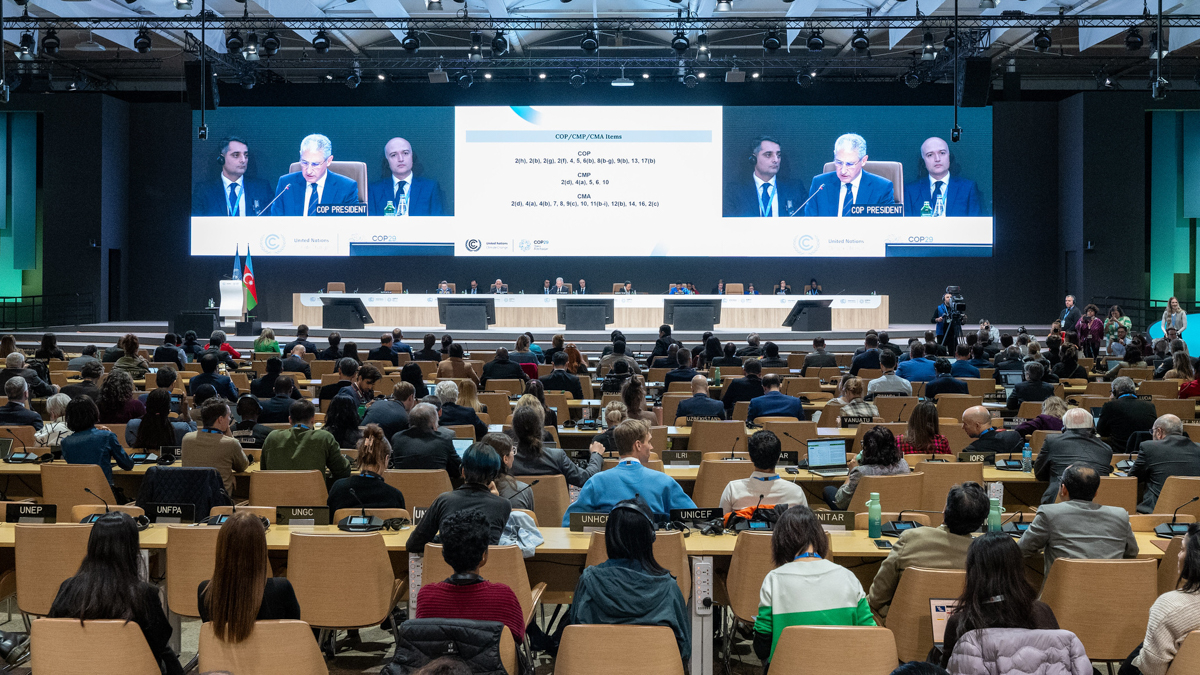UN Climate Conference agrees on finance goal

The UN Climate Change Conference COP29 reached an agreement on the new climate finance goal (New Collective Quantified Goal, NCQG) of USD 300 billion and a total NCQG of USD 1,300 billion. Decisions on the global monitoring framework for the process to phase out fossil fuels were left to the future climate conferences.
The UN Climate Conference COP29 in Baku, Azerbaijan ended with an agreement more than one day behind the schedule. The disputes concerning the two core issues, finance and mitigating emissions, continued until the very end. The Conference was exceptionally difficult.
An agreement was reached on the new common climate finance goal (New Collective Quantified Goal, NCQG) of USD 300 billion that will replace the present annual goal of USD 100 billion. The total goal should be reached by 2035.
“It is important to target climate finance to those who suffer from climate change the most, and to also mobilise private financing even more strongly. By this decision we will ensure that the sources of financing will expand from the present,” Minister of Climate and the Environment Kai Mykkänen sums up the outcome of the Conference.
So far, the goal has only applied to the traditional industrialised countries and financing has mainly been mainly collected from public sources. Industrialised countries still have a leading role in reaching the goal, but in future all climate financing channelled through multilateral development banks will also be taken into account. In addition, developing countries are invited to join the financing effort. Besides the actual USD 300 goal, all parties are encouraged to engage in cooperation so that climate financing targeted to developing countries can be increased to at least USD 1,300 by 2035.
No consensus on boosting energy transition
For the EU, it was important to have a strong enough wording on mitigating emissions and promoting the energy transition. In Dubai last year the world countries agreed on a process to phase out fossil fuels. Progress in energy transition is important because the countries should set the new national emission reduction targets before the COP30 Climate Conference next year.
The closing document of the Conference does not contain any significant steps forward in terms of the monitoring or implementation of the decision made in Dubai. For the work programme on mitigating emissions, only a process decision was reached and the discussion on the matter will continue in Bonn next summer.
“At the Conference we were seeking a much stronger commitment to the implementation of the decision made in Dubai and the energy transition. However, a skinny agreement is better than having no agreement at all if we wish to create pressure for China and other countries with the highest emissions to take climate action,” Mykkänen says.
The Conference in Baku showed that some of the oil producing countries are still against the energy transition agreed in Dubai. In particular, Saudi Arabia succeeded in its efforts to prevent the progress in the negotiations.
In practice, most countries share the view that urgent and sufficiently ambitious emission reductions are an absolute necessity to reach the targets set in the Paris Agreement. The work on mitigation will continue next year as we proceed towards COP30 in Belem. The G-20 countries have a big responsibility in the implementation of the energy transition. Next year the Parties will submit their new emission reduction targets under the Paris Agreement.
“It seems that the United States will again withdraw from the Paris Agreement. What was positive in this year’s Conference was that China showed its commitment to multilateral cooperation and climate work. In the current unstable global environment, an agreement to continue the climate work can be considered a major achievement,” Mykkänen says.
Negotiations on global market mechanisms completed
The negotiations on Article 6 of the Paris Agreement, i.e. the global market mechanisms, have continued for more than 10 years. The international market mechanisms enable the countries that have signed the Paris Agreement to also take climate actions outside their own national borders. Companies that want to buy carbon credits from the voluntary carbon market will also benefit from the market mechanisms.
“It is great that we have now completed the negotiations on the rules of the global carbon removal market. When used responsibly, we will benefit from the global market mechanisms and can mobilise private money flows better,” Mykkänen says.
Inquiries
Lyydia Ylönen
Special Adviser to Minister of Climate and the Environment Kai Mykkänen
tel. +358 50 476 1341
Marjo Nummelin
Finland’s Chief Negotiator
tel. +358 295 250227
Outi Honkatukia (finance)
Director of Climate Unit
tel. +358 295 250272
Kaarle Kupiainen (Global Stocktake of the Paris Agreement)
Ministerial Adviser
tel. +358 295 250232
Laura Kotila (requests for interviews with the Minister and experts)
Communications Specialist
tel. +358 295 250 405
